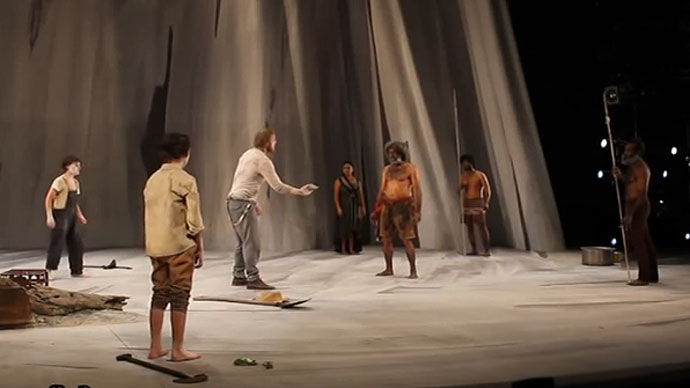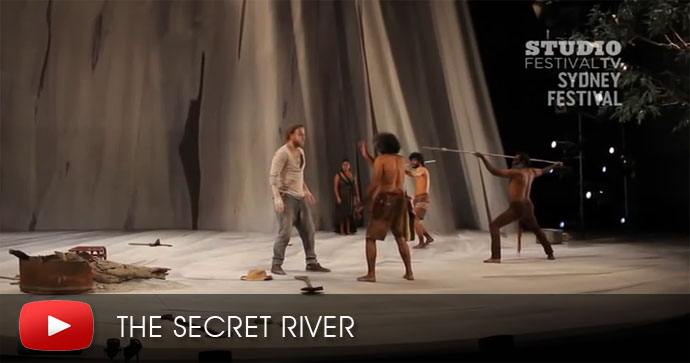Cultural appropriation and the portrayal of First Nations Peoples as lesser beings
Myths that Aboriginal people died of natural causes and that there are no 'real Aboriginal people left' continued to be advanced in an attempt to colonisation as 'somehow meant to happen ... somehow part of nature'. says Rachael Maza, Artistic Director.
Richard Watts Performing Arts Hub 21 January 2015
In a provocative keynote address at the Australian Theatre Forum this week Ilbijerri Theatre Company's Artistic Director, Rachael Maza, spoke powerfully and passionately about the differences between cultural appropriation and cultural exchange.

Rachael Maza
Ilbijerri Theatre Company's Artistic Director
Controversially, she singled out Sydney Theatre Company's critically-acclaimed recent production of The Secret River as an example of a work that, despite having the best of intentions, reinforced a number of negative stereotypes about Aboriginal Australians.
Maza said it was time the Australian theatre sector stopped viewing the world through a lens of white privilege and power; and stopped repeating old and deeply entrenched myths about Aboriginal people. 'We all are products of our upbringing, and we continue to unconsciously perpetuate our beliefs and values and the mores that we've grown up with. And we are not necessarily aware that we're doing it,' Maza said. 'Every time you turn on the television, for some reason all the characters on the soapie are white … and which is present in all our psyches, and determines our casting decisions and who we employ in our next job.'
She said theatre continued to perpetuate myths that sought to justify colonisation 'founded on the idea that there was a civilised, progressive people who had the right to invade and take over from and convert the lesser people - the savage.'
Myths that Aboriginal people died of natural causes and that there are no 'real Aboriginal people left' continued to be advanced in an attempt to colonisation as 'somehow meant to happen ... somehow part of nature'.
Citing the production of The Secret River, based on the novel by Kate Grenville, Maza said, 'This is very difficult for me, as I have nothing but incredible respect for the integrity of the artists that made this work and I suppose what this says to me is that it's not about whether you're a good person or a bad person; it's not a question of your integrity or your intentions - despite your best intentions in fact.'
In Grenville's novel the Aboriginal characters do not have a voice, In Andrew Bovell's play the Aboriginal characters speak in their own language while the white characters all spoke English. Maza said this was a problematic decision which effectively meant the Aboriginal characters came across as "savage".

'The decision to bring the Aboriginals on stage but not give them a voice that I could have access to? I realised all that did for me was perpetuate the mythology that Aboriginals were in the "savage" basket; the other … perpetuating this kind of chasm between us and them.
'On stage we saw seven black actors and seven white actors. The white actors spoke in English and the black actors spoke in language … [and] watching the production, I didn't have access to their voice. I couldn't. All I was seeing was gestural acting. I had very shallow access to the people on this side of the stage. All I understood was "go away" [or] "come here" and it was very basic, because of the gestures. And on the other side of the stage I came to know and really care about this young white couple and their two kids. I was able to empathise with their very complex moral dilemma that they were in.
'The decision to bring the Aboriginals on stage but not give them a voice that I could have access to? I realised all that did for me was perpetuate the mythology that Aboriginals were in the "savage" basket; the other … perpetuating this kind of chasm between us and them. And the other mythology was at the crisis moment [of the play; a massacre of Aboriginal people] … Here was this guy I really liked having to make this horrendous decision between going back to the gutters of London and give up his dream, or participating in one of the most heinous, horrendous acts to get what he's worked for.
'And the mythology that's perpetuated in that moment was that somehow, "we had to do what we had to do," and really there was no alternative for white people, which was extremely disturbing to me,' Maza said.
Maza also criticise the play's conclusion, when the play's lead white character meets the sole survivor of the massacre, played by Trevor Jamieson. 'It's devastating; it's a horrendous tragedy, this story … but in that moment, the mythology that again is perpetuated is that we all died out … and that is the only story that is told on that stage. And I know you can't tell every story. But the big question I walked away with was "How would I have ended it? How would I, as a black Australian, what is the story I want the audience to come away with? What is the message?
'I want the audience to walk away with the message that we are here, and we are strong, that we are a powerful, strong, thriving culture. We're alive and we're here ... So let's do it. Let's answer the question. Let's name it ... What is black theatre? And who is making stories, who has control over the stories that are being perpetuated, and who should have? What is right, and what is our right as Aboriginal people to say, "No, we need to have control over that mythology and those stories and narratives"?
Maza said in the light of Australia's long and shameful history of exploiting, exterminating and mistreating its Indigenous peoples; and more recently, exploitative policies such as the hijacking of land rights campaigns, attacks on Aboriginal sovereignty through the Intervention, and crippling cuts to legal aid, Aboriginal self-determination in theatre was just as important now as it was in her father's era.

'Black theatre was born out of an incredible period in the Sixties and Seventies, the incredible wave of politics that was happening at the time. And it was a tool by which to educate and mobilise [our] mob and their supporters, in the ongoing - for 200 years - struggle for land rights, self determination and sovereignty,' Maza said.
'Theatre was inseparable from politics. Theatre didn't exist for its own purpose. Black theatre was a way in which Aboriginal people could speak freely, unedited, uncensored. One hundred percent in control of what they said, when they said it, where they said it, and who they said it to. Black theatre was self-determination in practice.'
She acknowledged the contribution of non-Indigenous theatre-makers and the vitality of current work but said in order for black theatre to truly flourish, it was essential for the Australian theatre sector to have an honest about who owns and controls it.
'Historically we can observe that much of this work would never have been made were it not for the commitment, the experience and the privilege of those non-Indigenous directors, writers and producers that have worked in black theatre along the way … and there is unquestionably the passion and the dedication by these people to ensure that this work got out there and got produced and toured significantly. And the role of these non-Indigenous people in supporting black theatre is to be applauded.
'We're in an incredible time now to be having this conversation, where we've got a growing audience and a growing interest and appetite for our stories, for Aboriginal stories. There is definitely a shift happening in the psyche; and it's not unusual for us to be seeing, on an annual basis, an Aboriginal work in a major Festival program. The canon of works is growing. More and more works are touring internationally, and this must of course be a good thing, yeah? Surely this must be a sign that things are changing. That there is a shift in the national psyche; that there is a want to know more, to engage, to acknowledge, and to ultimately acknowledge and celebrate and claim the First Nations of this land.'
But she said it was essential to understand the differences between cultural appropriation and cultural exchange,'...to understand the difference between taking, without permission - which of course is basically stealing - from one culture with little or no understanding of the true significance or meaning of the culture that's being appropriated, and this often causing offence and harm to the culture that's being appropriated. As opposed to cultural exchange, which is based on a foundation of respect; of mutual respect. A real open, listening and sharing of ideas and experiences.
'So we come back to our question: what is black theatre, and who makes it? There is a significant growth in the appetite for Aboriginal theatre and yes, there is much to celebrate … but who is making the work, who has authorship of the work, and why is that important?
'My provocation to us as an industry is to say: let's name it. Aboriginal theatre is theatre that is made and told by Aboriginal people. We might not always be able to achieve it, but here, we set the bar.'
The Australian Theatre Forum 2015: Making It is running at the Seymour Centre, Chippendale until Friday 23 January. ArtsHub is attending the Forum and will be filing daily reports.
Secret River - The Movie
Rachael Maza is the Artistic Director of ILBIJERRI Theatre Company. Rachel is one of Australia’s most recognisable faces of the Australian film, television and theatre industry with performance credits including the AFI award winning Radiance, Cosi and Lillian’s Story. A WAAPA graduate, Rachael’s outstanding performances have been acknowledged with a Green Room Award and a Sydney Theatre Critics Circle award. Rachael has also worked as a narrator for ABC Radio National and as Indigenous Liaison Advisor on films such as the multi-award winning Rabbit Proof Fence. Rachael’s first taste for direction was for directing STOLEN (1992) for ILBIJERRI Theatre Company; however, it wasn’t until 2009 that she rejoined the company as Artistic Director. Since then she has directed SISTERS OF GELAM (2009), JACK CHARLES V THE CROWN (2010), FOLEY (2011) and BEAUTIFUL ONE DAY (2012).
Richard Watts (Article) is a Melbourne-based arts writer and broadcaster, and the founder of the Emerging Writers' Festival. In addition to writing for ArtsHub, Richard presents the weekly program SmartArts on 3RRR. He currently serves on the boards of La Mama Theatre and the journal Going Down Swinging, and is a member of the Green Room Awards Independent Theatre panel. Follow him on Twitter: @richardthewatts


